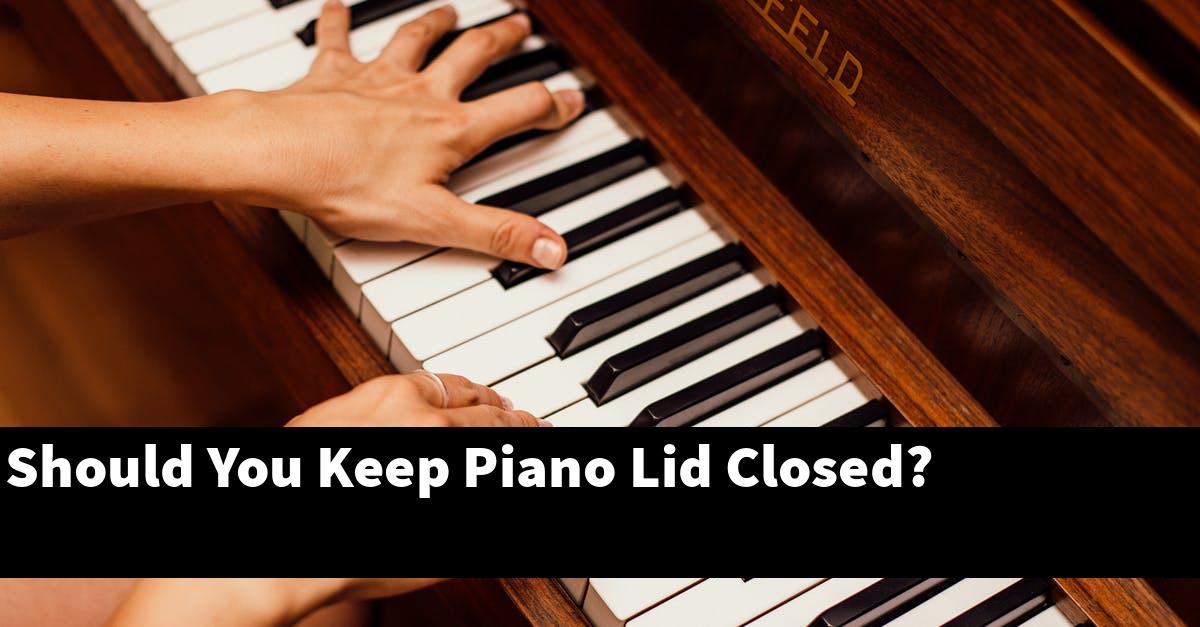It is generally advised to keep the lid closed to decrease the amount of dust that accumulates.
Piano technicians generally recommend that pianos be kept closed when not in use to prevent dust and other contaminants from entering the instrument.
How often should you clean your piano?
It depends on your specific piano and usage habits. In general, however, it is advisable to clean your piano every three to six months, depending on the amount of use it receives. Dust and dirt build up quickly on the piano’s keys, strings, and soundboard, and can cause the instrument to sound muffled or inaccurate.
Additionally, accumulated dust can also cause damage to the piano’s finish.
How should you store your piano?
Pianos are large, heavy, and expensive pieces of equipment. They deserve to be treated with the utmost care, and properly stored can mean the difference between an instrument that lasts for years and one that needs to be replaced sooner rather than later.
There are a few different ways to store a piano. A piano can be stored in its original case, which can provide some protection and keep the instrument in good condition.
Another option is to store the piano on a stand or in a cabinet. In either case, it is important to make sure the piano is level and the cabinet or stand is sturdy enough to support the weight.
It is also important to keep the piano away from moisture and dust. A piano can be stored in a climate-controlled environment, but it is best to avoid high humidity and dusty conditions.
If the piano must be stored in a humid or dusty environment, it is best to cover it with a protective cover.
Is it necessary to have a piano keyguard?
It is generally not necessary to have a piano keyguard, but there are certain situations where they may be beneficial.
For example, if you have a tendency to drop the piano keys, or if you are prone to having your fingers hit the keys inadvertently, a keyguard may help protect your fingers. Additionally, many pianos come with a keyguard pre-installed, so if you don’t want or need one, you may not have to purchase one.
Should you keep a piano open or closed?
It depends on your goals for the piano. If you play it regularly, keeping it open will keep it in good condition. If you only occasionally play it, closing it will keep it in better condition.
If the piano is properly maintained and the lid is properly closed, then the air inside the piano will be perfectly conditioned and stable. If the lid is not properly closed, however, the air inside the piano can become stagnant and inflamed, leading to a number of potential problems.
The most serious potential problem is that a stagnant air environment can cause the wood in the piano to rot. This is especially a problem if the piano is left open to the air for an extended period of time, as neglecting to close the lid can allow water and other pollutants to enter the instrument and cause corrosion.
A second potential problem is that open pianos can also be a breeding ground for dust mites. These tiny creatures thrive in an environment with a high level of moisture and organic material and can cause significant damage to the piano’s finish as they consume the lacquer.
In general, it is best to keep your piano closed when not in use. This will prevent the air inside the instrument from becoming stagnant and damaging the wood or finish, and it will also keep the dust mites from multiplying.
Should piano be covered?
There is no definitive answer to the question of whether or not piano should be covered, as the decision depends on a variety of factors specific to each individual piano. However, there are a few general points that should be considered when making this decision.
When considering whether or not to cover a piano, the first step is to assess the condition of the instrument. If the piano is in need of major repairs or restoration, it may be best to forgo covering it. Additionally, if the piano is in a high-traffic areas, such as a public area, it may not be worth the extra expense to cover it.
Another important factor to consider is the cost of covering the piano. While it may be more expensive to cover an instrument than to repair it, it may be worth the expense if the piano is in a high-traffic area or if it is in need of major repairs.
Ultimately, the decision of whether or not to cover a piano will depend on a variety of factors specific to the individual piano.


